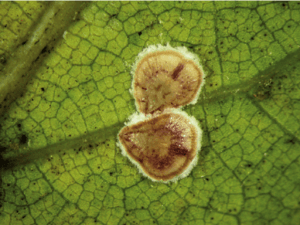Pyriform scale facts for kids
Quick facts for kids Pyriform scale |
|
|---|---|
 |
|
| Protopulvinaria pyriformis (Coccidae) on a leaf | |
| Scientific classification |
|
| Kingdom: | Animalia |
| Phylum: | Arthropoda |
| Class: | Insecta |
| Order: | Hemiptera |
| Suborder: | Sternorrhyncha |
| Family: | Coccidae |
| Genus: | Protopulvinaria |
| Species: |
P. pyriformis
|
| Binomial name | |
| Protopulvinaria pyriformis Cockerell, 1894
|
|
| Script error: The function "autoWithCaption" does not exist. | |
Script error: No such module "Check for conflicting parameters".
The Protopulvinaria pyriformis, often called the pyriform scale, is a small insect. It belongs to the soft scale insect family, Coccidae. This insect is a common pest that causes problems for avocado trees. You can find it in many parts of the world where avocados are grown.
Contents
About the Pyriform Scale
The adult female pyriform scale has a unique shape. It looks like a pear or a heart and is about 3 mm (0.12 in) long. A hard, reddish-brown covering with stripes protects its body. When the female is fully grown, this covering gets harder. A fluffy white sac, called an ovisac, sticks out from under it. This sac holds the eggs.
Male pyriform scales are not often seen. For example, they are not known in South Africa, but they have been found in Florida. The young insects, called nymphs, are pale green, flat, and oval. The eggs are a pale yellow color.
Where They Live
The pyriform scale is found in many countries. These include Australia, South Africa, Israel, Italy, France, Spain, Cuba, Florida, and Peru. It usually lives on avocado trees. In Peru, it is considered the worst insect pest for avocados. However, in Spain, it has also been found on citrus trees, like oranges and lemons. Some types of avocado trees seem to be more easily attacked by this pest than others.
Life Cycle of the Pyriform Scale
The adult female pyriform scale lays many eggs, usually between 200 and 300 at a time. In most groups, females can lay eggs without a male, a process called parthenogenesis. The female keeps the eggs in her ovisac until they hatch.
The first stage of a young insect is called a crawler. These tiny crawlers move away from their mother. After about 10 days, they grow into a second stage, or instar. Then, after another 17 days, they become a third instar. About 25 days later, they turn into an immature adult. This stage lasts for about 28 days. After that, they become a mature adult and start laying eggs. A mature adult lives for about 45 days.
Unlike most soft scale insects, the female pyriform scale can actually move around. In places like South Africa and Israel, there are two full generations of these insects each year.
How They Harm Plants
Both adult and young pyriform scales feed by sucking sap from their host plants. Sap is like the plant's blood. The main problem caused by this pest is the sticky liquid it produces. This liquid is called honeydew.
A black fungus, called sooty mould, grows on this honeydew. This mould covers the leaves and blocks sunlight. When sunlight is blocked, the plant cannot make enough food, a process called photosynthesis. This makes the plant weak. Leaves might fall off, young shoots can dry up, and the fruits might become smaller or fewer in number.
Images for kids
 | Delilah Pierce |
 | Gordon Parks |
 | Augusta Savage |
 | Charles Ethan Porter |


